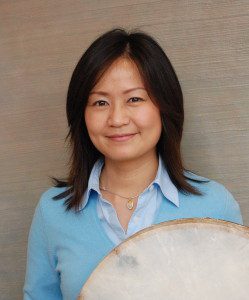
Using a decidedly contemporary language of diverse harmonic color, inventive timbre and ingenious effects, award-winning composer Yu-Hui Chang has written a wide range of music that compels and resonates with professional musicians and audiences alike. She is the recipient of fellowships from the Guggenheim Foundation, the American Academy of Arts and Letters, Radcliffe Institute at Harvard University, and commissions from the Fromm Music Foundation, Koussevitzky Music Foundation, Barlow Endowment for Music Composition, and Meet The Composer (now New Music USA). Additional honors include the Aaron Copland Award, Yoshiro Irino Memorial Prize from the Asian Composers’ League, and the Council for Cultural Affairs of the Executive Yuan (Taiwanese government agency, now Ministry of Culture.)
A native of Taiwan, Yu-Hui began her intensive music training in piano, voice, and music theory at the age of six, and started seriously pursuing composition as a career at the age of fourteen. After graduating from the National Taiwan Normal University, she came to the United States in 1994 and received her graduate degrees from Brandeis University (Ph.D.) and Boston University (MM). Now an Associate Professor at Brandeis University, Yu-Hui taught at the University of California-Davis between 1999-2006. As a dedicated promoter of contemporary music, Yu-Hui co-directed the Empyrean Ensemble, the ensemble-in-residence at UC Davis, between 2000-2006. In 2009 she was appointed Co-Artistic Director of Dinosaur Annex Music Ensemble, a leading exponent of contemporary music performance since 1975. Collectively she has curated more than seventy concerts.
Performances of Yu-Hui’s compositions have taken places across continents in the Netherlands, Italy, UK, Denmark, New Zealand, Australia, China, Japan, South Korea, Taiwan, and throughout the U.S. to critical acclaim by many first-rate musicians and organizations such as the National Symphony Orchestra of Taiwan, Taipei Symphony Orchestra, San Francisco Chamber Orchestra, Sacramento Philharmonic Orchestra, Nieuw Ensemble, Lydian String Quartet, and Alexander String Quartet. Among the numerous commissions she has received are those from the Boston Modern Orchestra Project, Taipei Symphony Orchestra Chorus, Left Coast Chamber Ensemble, Earplay, Alea III, Volti, Triple Helix Piano Trio, Ju Percussion Group, Monadnock Music Festival, Arts Council Korea, Mondavi Center for the Performing Arts, National Chiang Kai-Shek Cultural Center of Taiwan, the 2003 Seoul International Festival of Women in Music Today, and many other individual musicians.
In the summer of 2011, Yu-Hui was invited to be the Guest Composer at the Wellesley Composers Conference. She has also been featured in the Asian Music Festival in Tokyo, the Asian Contemporary Music Festival in Seoul, the Pacific Rim Music Festival at UC Santa Cruz, and the Festival of New American Music at California State University – Sacramento. In March 2006, Works and Process at the New York Guggenheim Museum presented three of her works, highlighting Yu-Hui as a new talent of the younger generation.
Yu-Hui’s compositions may be found in CDs recorded by the Left Coast Chamber Ensemble (Shadow Chase – for string quartet), pianist Lara Downes (Ballade, “Reform” album, Azica Records), pianist Amy Briggs (Tangled in Smoke, “Tangos for Piano” album, Ravello Records), Volti (Being, “House of Voices” album, Innova Recordings), cellist Rhonda Rider (Rio del Tizon, “The Grand Canyon Project” album, MSR Classics), and violinist Daniel Stepner (Worries Just As Real, “Music At Brandeis” album, Centaur Records). Yu-Hui also appears as a conductor in composer Ross Bauer’s CD “Ritual Fragments” and as a pianist in a CD titled “Tribute to Chou Wen-chung”, both released by the Albany label.
—
 In January 2014, Erin Gee was cited by Alex Ross, music critic for The New Yorker, as a member of the short list of the most influential composer-vocalists of the 21st century and since then has been awarded the Charles Ives Fellowship from the American Academy of Arts and Letters and a Bogliasco Fellowship. This marks a turning point in the trajectory of international recognition through the performance of her series of compositions entitled Mouthpieces, which uses non-traditional vocal techniques, devoid of semantic language, to construct intricate and subtle patterns of a diverse array of vocal sounds. In the Mouthpieces, the voice is used as an instrument of sound production rather than as a vehicle of identity. Linguistic meaning is not the voice’s goal. The construction of the vocal text is often based on linguistic structure—vowel-consonant formation and the principle of the allophone—and is relatively quiet, with a high percentage of breath. The Mouthpieces began as solo vocal works, devoid of semantic text or language and notated with the International Phonetic Alphabet. In the Mouthpiece series, the voice is used as an instrument of sound production rather than as a vehicle of identity. Linguistic meaning is not the voice’s goal.
In January 2014, Erin Gee was cited by Alex Ross, music critic for The New Yorker, as a member of the short list of the most influential composer-vocalists of the 21st century and since then has been awarded the Charles Ives Fellowship from the American Academy of Arts and Letters and a Bogliasco Fellowship. This marks a turning point in the trajectory of international recognition through the performance of her series of compositions entitled Mouthpieces, which uses non-traditional vocal techniques, devoid of semantic language, to construct intricate and subtle patterns of a diverse array of vocal sounds. In the Mouthpieces, the voice is used as an instrument of sound production rather than as a vehicle of identity. Linguistic meaning is not the voice’s goal. The construction of the vocal text is often based on linguistic structure—vowel-consonant formation and the principle of the allophone—and is relatively quiet, with a high percentage of breath. The Mouthpieces began as solo vocal works, devoid of semantic text or language and notated with the International Phonetic Alphabet. In the Mouthpiece series, the voice is used as an instrument of sound production rather than as a vehicle of identity. Linguistic meaning is not the voice’s goal.
The series began as one piece for solo voice, which she began performing as a graduate student, and has grown to over 25 works for orchestra, opera, vocal ensemble, large chamber ensemble and string quartet, which have been performed internationally with some of the top ensembles for new music. Her works are taught in the composition and musicology programs of many leading universities such as MIT, University of Pennsylvania, Smith College, and Mills College, and she has lectured at Harvard, UC Berkeley, Dartmouth and Wellesley. Ms. Gee’s career began with commissions for her own voice as a soloist or in combination with other instruments, but now regularly includes requests from singers wishing to perform her works, or commissions from ensembles and vocalists who would like to interpret a newMouthpiece in the series.
Her debut portrait CD, Mouthpieces was released in January 2014 on the col legno label in Vienna and received a warm and thoughtful review in Gramophone, the premier review magazine for classical music. The review stated, “Erin Gee clearly has a contribution to make,” and mentioned the “tangible virtuosity of Gee’s formidable vocal execution, as well as the comparable (if relatively more orthodox) finesse of the instrumental component.”
Gee’s awards for composition include a Guggenheim Fellowship, a Radcliffe Fellowship, the 2008 Rome Prize, Zürich Opera House’s Teatro Minimo, and the Picasso-Mirò Medal among others. She has been commissioned by the Zurich Opera House for the opera SLEEP, by the Radio Symphony Orchestra Vienna, the Los Angeles Philharmonic New Music Group under Esa-Pekka Salonen, and for four pieces by Klangforum Wien. Gee has also worked with the Latvian Radio Chamber Choir, Ensemble Surplus, Alter Ego, Either/Or Ensemble, Wet Ink, Metropolis Ensemble, Repertorio Zero, and many others. The American Composers Orchestra commissioned Mouthpiece XIII: Mathilde of Loci Part I for Zankel Hall in Carnegie Hall, which was highlighted in Symphony Magazine (March/April 2010), and cited in the New York Times as “subtle and inventive.”
She has had performances in Europe, North America, South America, Hong Kong and Japan and in the Wittener Tage für Neue Musik, Musik Protokoll in Steirischer Herbst, Klangspuren, Darmstadt Festival Summer Courses, the Sonic Festival, and the Zurich Tage der Neue Musik among others. Gee was in residence at the Montalvo Arts Center and the Akademie Schloss Solitude in Stuttgart in 2010. She is active as a vocal performer of her own work, but it is not designed exclusively for her voice.
Ms. Gee is currently an Assistant Professor of Composition at the University of Illinois, Urbana- Champaign. Her chapter titled “The Notation and Use of the Voice in Non-semantic Contexts: Phonetic Organization in the Vocal Music of Dieter Schnebel, George Aperghis and Brian Ferneyhough” is published by Routledge Press in the book Vocal Music and Contemporary Identities, edited by Christian Utz and Frederick Lau.
Through her Mouthpiece series she has created an ephemeral world that expands the possibilities of the voice, leaves behind the constrictive structure of language, and replaces histrionic female vocals with a virtuosic mouth and a tabula rasa for an emotional palate. Composer, Professor and former Arts Director for the American Academy in Rome Martin Brody’s states in his CD liner notes, “Erin Gee presents a set of voluptuous enigmas – a taxonomy of finely-etched utterances devoid of meaning; an orderly syntax of sounds that vaporizes fixed forms; an aesthetic environment that feels at once extraterrestrial and uncannily familiar.”

Pingback: nF 2016 Featured Composers |